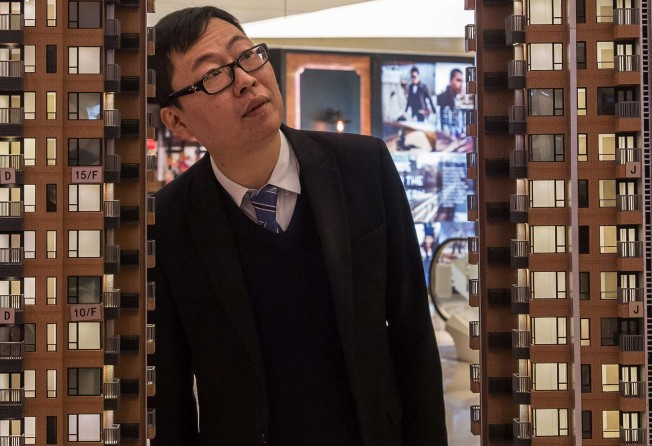Ailing Hong Kong property market in need of a boost, and it’s time the government relax its cooling measures, analysts say
Liquidity needs to be freed up to stimulate demand as massive supply of new housing is expected to come on stream in the second half of the year

Several property analysts have called on the government to loosen the measures it had introduced to cool the market in the wake of falling prices since late last year.
Sales in certain areas have slumped to five-year lows, prompting some market players to advocate the easing of mortgage restrictions in order to help existing homeowners move up the housing ladder and restore market liquidity.
According to the Rating and Valuation Department, small- and medium-sized, and large-sized home prices fell by more than 10 per cent in May from their peaks in August and September last year.
The government introduced three sets of punitive taxes, buyer’s stamp duty (BSD), special stamp duty and double stamp duty (DSD) to curb speculation and discourage foreign and corporate buyers from snapping up local property.
But strategists insist they are a double-edged sword. Joseph Tsang, managing director of JLL Hong Kong, says DSD, which levies extra stamp duty on second-home buyers, is suppressing a substantial part of sales.
“Second-hand property deals are expected to shrink to around 3,000 in June, a volume even worse than during the Sars outbreak in 2003,” he says.
“It’s very unhealthy, as the secondary market has dried up, limiting the [value] of real estate as an asset.”
Tsang says the lack of market liquidity is hindering middle-class households from being in a situation where they can move up the housing ladder.
“Suppose an existing homeowner could afford to buy a new home, chances are that he will find it very difficult to dispose of the existing property on the market at a price he is comfortable with,” Tsang says. “Middle-income households that need to upgrade to a bigger home are now stuck.”
Instead of lifting all tightening measures, Tsang has urged the government to relax the mortgage rules, especially the loan-to-value (LTV) ratio – at present 60 per cent for certain homes – for second-home buyers, which restrict their ability to buy a new home.
Tsang says that if upgraders were allowed to borrow up to 70 or 80 per cent of the property’s value from banks, more capital would be freed up and this would help boost the secondary market.
As far as supply is concerned, the government has reiterated that it will stick with its housing supply and land sales targets in line with the city’s long-term housing strategy.
Expecting a glut of new supply in the second half, Jacinto Tong Man-leung, founder of Gale Well Group, suggests that the tightening measures be adjusted in order to unleash some demand to absorb excessive stock.
“At the time these cooling measures were implemented, housing supply was inadequate,” Tong says. “But now we are seeing massive supply coming on stream, demand is still locked up.
“There is a real urgency to rebalance the supply and demand equation by loosening some mortgage restrictions.”
As an example, for a family with two working professionals, the couple would have to save HK$10 million in cash for the down payment in order to buy a HK$20 million apartment.
“Remember, apart from saving for a hefty down payment, they have to pay monthly rent at the same time. This discourages them from spending their disposable income elsewhere. That’s not good for our economy.”
He advocates raising LTV ratios for first-time buyers to 75 per cent, regardless of the property’s value. Another suggestion is to allow for more flexibility for new immigrants.
New immigrants have to live in Hong Kong for seven years to qualify for a permanent identity card. Before that, they are subject to the BSD, which is equivalent to 15 per cent of the property’s value.
“If new immigrants, for example those who have lived in Hong Kong for three years, are exempted from paying the BSD, I believe this is another way to attract and retain foreign talent,” Tong says.
He suggests that a sunset provision or clause be incorporated into future housing policies. “This promotes transparency ... the market can know when policies are reviewed, and under what circumstances restrictions would be relaxed or lifted.”
From the government’s perspective, home prices are still beyond the reach of most people and higher than when the cooling measures were implemented.
This means there is little reason for them to be removed, says Dr Lawrence Poon, a senior lecturer in the building science and technology division at the City University.
“I think the government believes it is not the right time yet. Besides the housing affordability issues, a couple of factors, including Brexit [Britain last month voted in a controversial referendum to leave the European Union] and potential interest rate hikes, pose risks to the external economy.”
While Hong Kong’s economy is still fundamentally strong with low jobless rates and healthy tourist figures, policymakers are cautious when considering policy relaxation so that they don’t send the wrong signal to the market, Poon says.
“Having said that, I think there is room to review and relax the mortgage restrictions to help homeowners move up the ladder,” he says.
“Policymakers may also have to think about when the right time will be to gradually ease property cooling measures.
“There is no denying that politics plays a significant role in housing policy agenda. It seems to me that Hong Kong’s housing market is being deterred by policy uncertainty rather than economic conditions.
“To see a clearer picture, we will probably have to wait until after the chief executive election next year.”